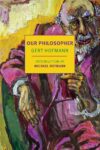Tr. from the French by Nathanaël
Released in 2003 in French, 2006 in English (as translated by the author), and now, beautifully, the English version re-released jointly here by Nightboat and Book*Hug, Je Nathanaël is an intimate book which has lived, already, many lives. And which connects itself to lives beyond its own. The work Les nourritures terrestres by André Gide shows up in Je Nathanaël again and again explicitly via epigraphs and references. Indeed, Gide is an overwhelming presence about the work — glimpses appear, for instance, of his life and writing, his anti-coloniality, his sensationalizing and eroticizing of the colonial subject, his early defense of homosexuality yet also pedophilia. The connection is not merely with Gide as a figure but Les nourritures terrestres in particular. Both Les nourritures terrestres and Je Nathanaël are written to a Nathaniel, driven less by character or plot than association, developing thought, and lyric address. Not much ‘happens’ in Les nourritures terrestres per se — yet a style of thought unfolds, a relation of address — a kind of proto-lyric-memoir — develops. Yet Je Nathanaël’s relation to Les nourritures terrestres, while formally necessary, is more conceptual starting-point than commentary. The figure of Nathaniel / Nathanaël becomes an orientation in common between the two works — a shared compositional strategy however starkly different their respective effects and ends. Je Nathanaël dwells, ultimately, less on possible allegiances with Les nourritures terrestres or Gide more broadly than on reinscribing the concerns of Les nourritures terrestres onto a newer, diffused literary landscape.
Nathanaël drastically, for instance, reconfigures presence and non-presence, identity and non-identity, of the author (speaker, lover, and so on) and the addressed, beloved reader. Where once, for Gide — and modernity writ large — the author was a metaphysical presence, an authority, whether absolute or negative, the author here is temporally-fixed and partial: self-aware, both author and reader, cognizant of the petite-celebrity the 20th C. author has since passed through, always calling attention to the writer’s predilection and finitude. A line, for instance, like “things are no more false than is this name I call you by, . . . Nathaniel, who will one day read me”[1] in Gide becomes for Nathanaël:
Nathanaël is long gone he was never here not even once. . . . You cannot even mourn him because he is not dead. He is not dead because he is not alive. Nobody knows who Nathanael is. Have you seen him? I have only seen him from behind in a painting and not a very good one at that. I hear he likes to run in the rain and sleep with his eyes open.
Nathaniel, for Gide, is the You, always outstanding, the ultimate addressee, confined by no restriction. Such a character is necessarily exemplified in the young man or boy (and, I would be remiss if I didn’t remind the reader of Gide’s defense of ‘pederasty,’ the necessity that ‘the boy’ be t[r]opically ‘free’, will-less, for Gide). For Nathanaël, however, the boy becomes limited, concrete, yet, similarly, albeit tragically, a partial presence. He is seen from behind, horrifyingly perhaps, only and once. He is one only ever heard about; he does not speak. Perceived lack of restriction is far from absolutizing in a positive sense for the work — Nathanaël is not free in being ‘never there,’ rather he is always already gone or leaving. Nathanaël as ur-boy becomes not an ideal You but exemplary of the incessant, semic position of any you — whether speaker, addressed, reader, read. He “haunt[s] you”; he is polymorphous. In Je, Nathanaël, the speaking subject, or more properly, speech, is not a question of absolute being but partial positions and orientations. Where Nathaniel once was exhausted by speech (I weep because I have nothing else to say), Nathanaël comes before and after, precedes and antecedes speech (Everything remains to be said so long as we have said nothing).
Gide certainly provides a structural periphery, but Je Nathanaël contains other possible lineages in addition to, certainly, standing beautifully on its own. For all the talk about sex in Gide, as is often said of Freud, there is in fact very little sex there. Yet Je, Nathanaël begins explicitly with sex. For instance, “Fucking claims genealogy” or “Fucking. Which way in? And out? Book. I tear out all the pages. Lay you out on your belly. Say open up. I lose myself.” In such moments Nathanaël’s lyric scope seems more akin to Wittig’s Le corps lesbien or Cixous’ Le troisième corps.
The most overriding, striking similarity, to me, however, was to Duras, especially in films like L’homme atlantique, or even Hollis Frampton, where excruciating, formal repetitions give way to, open up, semiotic possibilities at once conceptual and lyric. As one example among many, in book two each poem begins “ — Here I am” resulting in, in addition to a sense of constraint, an opportunity to explore the simple affective power of repetition. This is especially so with regards to loss and recurrence:
— Here I am. / Standing on a bridge. I am standing on a bridge. You are not here. You have disappeared. From where you were. The place from which you projected your voice. You are no longer there. You say: Enter. I enter. Say: Here I am. And you are no longer there.
It is in moments such as these — where the technical risk of the work and vulnerability coincide — Je, Nathanël proves heart-rendingly effective. Such pronouncements, in the wake of Gide, the speaking subject, the stabilized “boy,” provide an intimacy long-past the metaphysics of presence or absence; the you, once absolute, enters the repetitions which constitute the “no longer there” of the subject, the author, the lover, generally, yes, but also the intimate, absent particular: the lover is gone — and we feel this to be true.
Having begun with the lovers, passed through what is no longer there, we conclude with, as we must, the book. And like the lover, the book, too, is a thing we leave; as Gide tells us, once “you have read me, throw this book away — and go out.” The book is a thing one always is leaving. Yet, then, why approach, pick up the book to begin with? “The book is, must be, a call to the senses. There is little else to do than leave it” Nathanaël tells us. I’m reminded, in such moments, of Shelley’s claim that poetry is an act of imagining what we already know. The book is a call — back to what? ourselves? our own departure? — a kind of resonance of, within, a familiar space. Wherein modernity the word is intention and breath, here, it is now above all resonance, space, echo — a call to the sensuality of sense, possibly, especially and necessarily, in its absence.
Je, Nathanaël is a broken address, left to resonate in the now empty rooms that the lover, the You, has left. It is a small book which deserves time, caution, attention; after all, as the speaker indicates near the work’s closing, “People are wary of small books, intimate books that slide effortlessly into a pocket. The book’s measure is the word” seemingly only. We are right to be wary of this. And yet, and yet, “what of the power of the echo?”
[1] All quotations from Les nourritures terrestres are from Dorothy Bussy’s 1952 translation.
Jos Charles is author of feeld, long-listed for the 2018 National Book Award and a winner of the 2017 National Poetry Series, and Safe Space. She is a recipient of the 2016 Ruth Lilly and Dorothy Sargent Rosenberg Fellowship. Charles has an MFA from the University of Arizona and is pursuing a PhD in English from UC Irvine.
This post may contain affiliate links.








